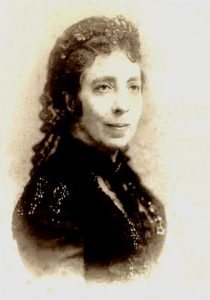 Pauline Garcia Viardot (1821-1910) french-spanish composer, singer (mezzo), piano virtuoso, teacher, music salon patroness. Described as opulent, temperamental, exotic and seems to have been the centre of all the European cultural elite of her days. Fact is, you could get away by only reading her biography to get to know EVERYONE from those days – from Tchaikovsky via the Schumanns to Saint-Saëns.
Pauline Garcia Viardot (1821-1910) french-spanish composer, singer (mezzo), piano virtuoso, teacher, music salon patroness. Described as opulent, temperamental, exotic and seems to have been the centre of all the European cultural elite of her days. Fact is, you could get away by only reading her biography to get to know EVERYONE from those days – from Tchaikovsky via the Schumanns to Saint-Saëns.
Born in Paris into a Spanish family of musicians – the mother, father, brother and sister Maria Malibran were all successful singers. Viardot studied piano for Liszt and counterpoint for Reicha, but was mainly taught by her mother who steered her into her singing career. Viardot often played piano with her friend Chopin, whose mazurkas she arranged for voice (as she also did with other instrumental music by e.g. Haydn and Schubert). And in the same circle she met George Sand who based her bestselling novel “Consuelo” on Viardot.
1890 Viardot was included in the Royal Swedish Academy of Music.
Her works list reflects the fact that she was a professional singer: the songs dominate and depending on sources number between 50-200 (!). In concert, she would often perform her own compositions and accompany herself on piano. The songs are in a wide range of languages, a fact showing the many places she lived. For instance, she was for several seasons employed at one of the operas in St Petersburg, and for political reasons lived a few years in Baden-Baden. Don’t miss Cecilia Bartoli’s recordings of some of her French songs! Generally, there are a lot of strong, dramatic songs – if you are looking for inspiration for those.
Viardot is also known for her four operettas and one (or two?) opera(s), and for me this music stands out as favourites from her production. One of them, Le dernier sorcier for singing and speaking roles, childrens’ chorus & piano, is recorded in its complete form and can be found on Spotify (embedded here below).
After hearing one of Viardot’s operettas Clara Schumann, Viardot’s friend of almost the same age, called Viardot the most brilliant woman she has ever seen. Liszt called her the first woman composer genious (regulars to this site of course know that Liszt probably hadn’t studied his music history very well, but anyway nice of him to say so).
Several of her children followed in the family’s footsteps: daughter Louise Héritte-Viardot also became a composer (and writer), her son Paul a violinist and composer, and two more daughters became professional singers.
There is a wealth of music already recorded and a lot of thick books about her written, so go explore!
Did this leave you a feeling of wanting to play and sing her music yourself? Some sheet music can be found here.
